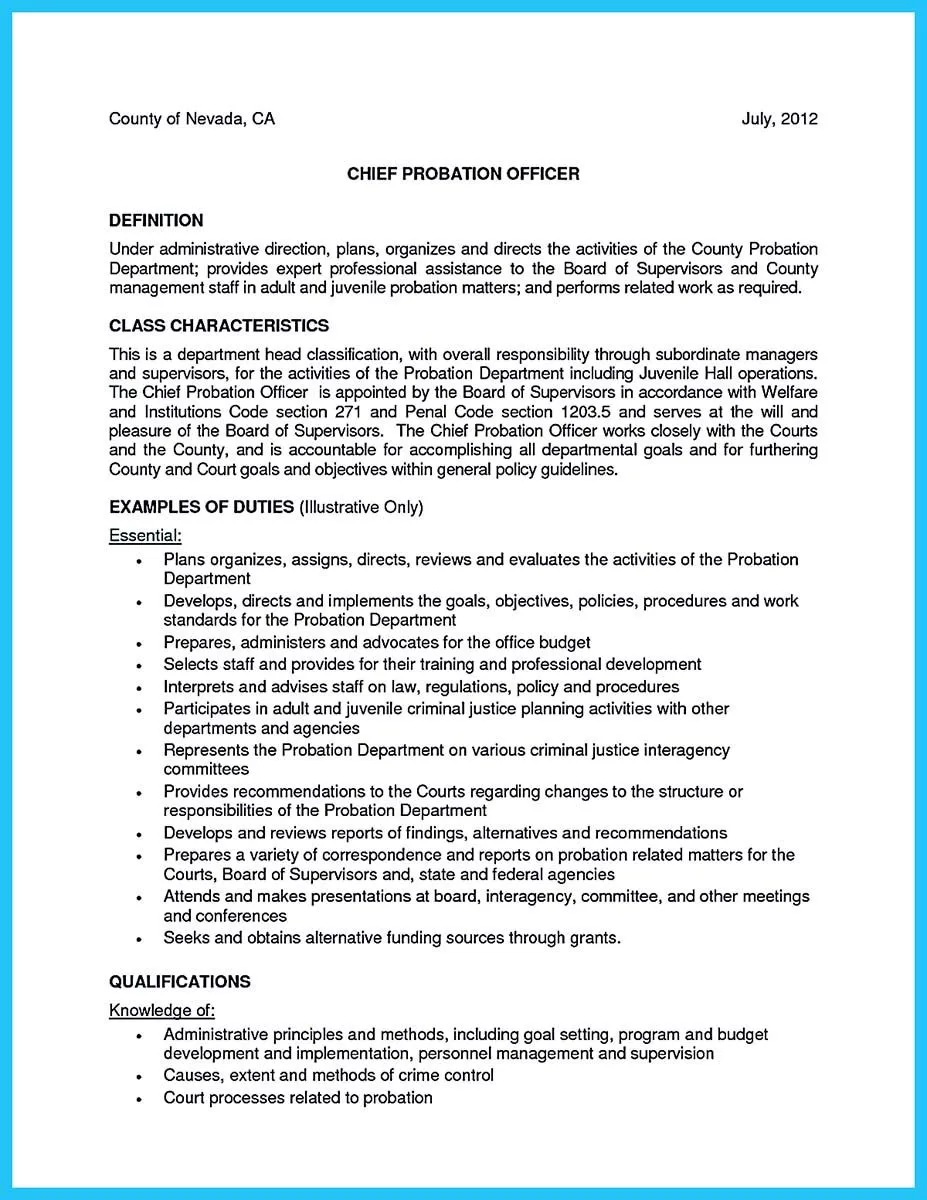Crafting Your Correctional Officer Cover Letter
A compelling correctional officer cover letter is your first opportunity to impress potential employers, especially when you have no prior experience in the field. This document serves as your introduction, providing a detailed overview of your skills, qualifications, and enthusiasm for the role. Even without direct experience, a well-crafted cover letter can highlight your potential and suitability for the position. It’s crucial to remember that the cover letter isn’t just a formality; it’s a vital tool in demonstrating your understanding of the job requirements and your commitment to becoming a correctional officer. The letter should be professional, concise, and tailored to the specific facility you are applying to. This demonstrates your attention to detail and genuine interest in the organization. Your goal is to convince the hiring manager that you possess the qualities they seek, making you stand out from other applicants.
Highlighting Transferable Skills
One of the most effective strategies for a correctional officer cover letter with no experience is to emphasize transferable skills. These are abilities and competencies gained in previous roles, education, or volunteer activities that are applicable to a correctional officer position. Think about situations where you’ve demonstrated strong communication, problem-solving, teamwork, or leadership abilities. For example, if you have experience in customer service, highlight how you handled difficult situations or maintained composure under pressure. If you’ve worked in a volunteer capacity, describe instances where you collaborated with a team or took initiative in a project. Your cover letter should explicitly state how these transferable skills align with the responsibilities of a correctional officer. Be specific; use the STAR method (Situation, Task, Action, Result) to provide concrete examples of how you utilized these skills in the past. This approach helps potential employers understand your capabilities, even without direct law enforcement experience. This will also give a better idea of your abilities.
Communication Abilities
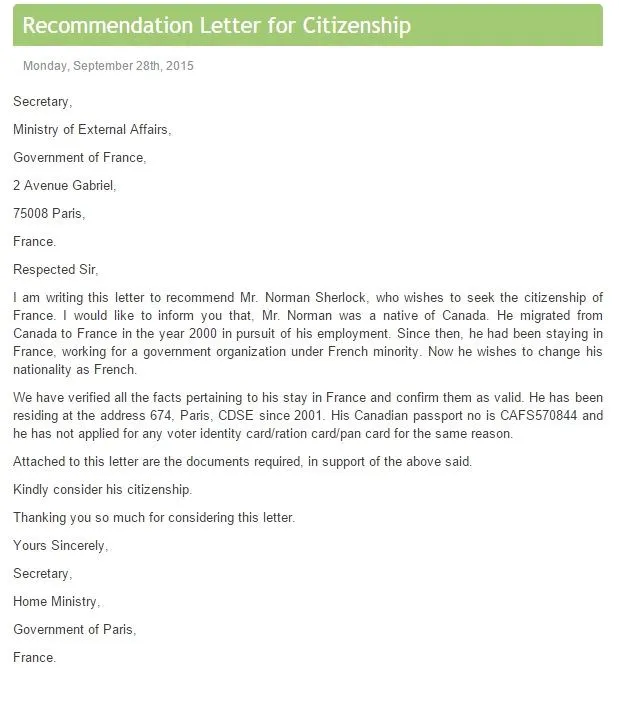
Effective communication is a cornerstone of a correctional officer’s role. In your cover letter, showcase your ability to communicate clearly, concisely, and respectfully, both verbally and in writing. Highlight experiences where you successfully conveyed information, resolved conflicts, or provided instructions. For example, describe a situation where you had to explain a complex issue to someone who didn’t understand. The ability to listen actively, empathize, and adapt your communication style to different individuals is also essential. Emphasize any public speaking experience, presentation skills, or writing proficiency you possess. These skills are important to document incidents accurately, write reports, and interact with inmates, colleagues, and supervisors. When you do list these skills, make sure you use an example that shows how you used them in the past.
Teamwork and Collaboration
Correctional facilities operate on teamwork. In your cover letter, emphasize your ability to work collaboratively and contribute effectively to a team environment. Describe instances where you worked with others to achieve a common goal, resolve a conflict, or support a team member. Highlight your ability to listen to others, respect diverse perspectives, and share responsibilities. Teamwork is essential in a correctional setting for maintaining order, responding to emergencies, and ensuring the safety of staff and inmates. If you’ve participated in team projects, sports, or volunteer activities, describe your role and how you contributed to the team’s success. Showing that you can communicate effectively and work well with others is crucial to show you can be an asset in the workplace.
Adaptability and Problem-Solving
Correctional officers often face unpredictable situations and must be able to adapt quickly and make sound decisions under pressure. Highlight your problem-solving skills and your ability to remain calm and composed during stressful times. Describe instances where you had to think on your feet, analyze a situation, and find a solution. If you’ve experience with crisis management or conflict resolution, be sure to mention it. Emphasize your ability to learn quickly, follow instructions, and adapt to changing circumstances. Correctional facilities are dynamic environments, and the ability to think critically and act decisively is highly valued. Showcasing these qualities will demonstrate that you’re prepared to handle the challenges of the job and contribute to a safe and secure environment.
Demonstrating Your Understanding of the Role
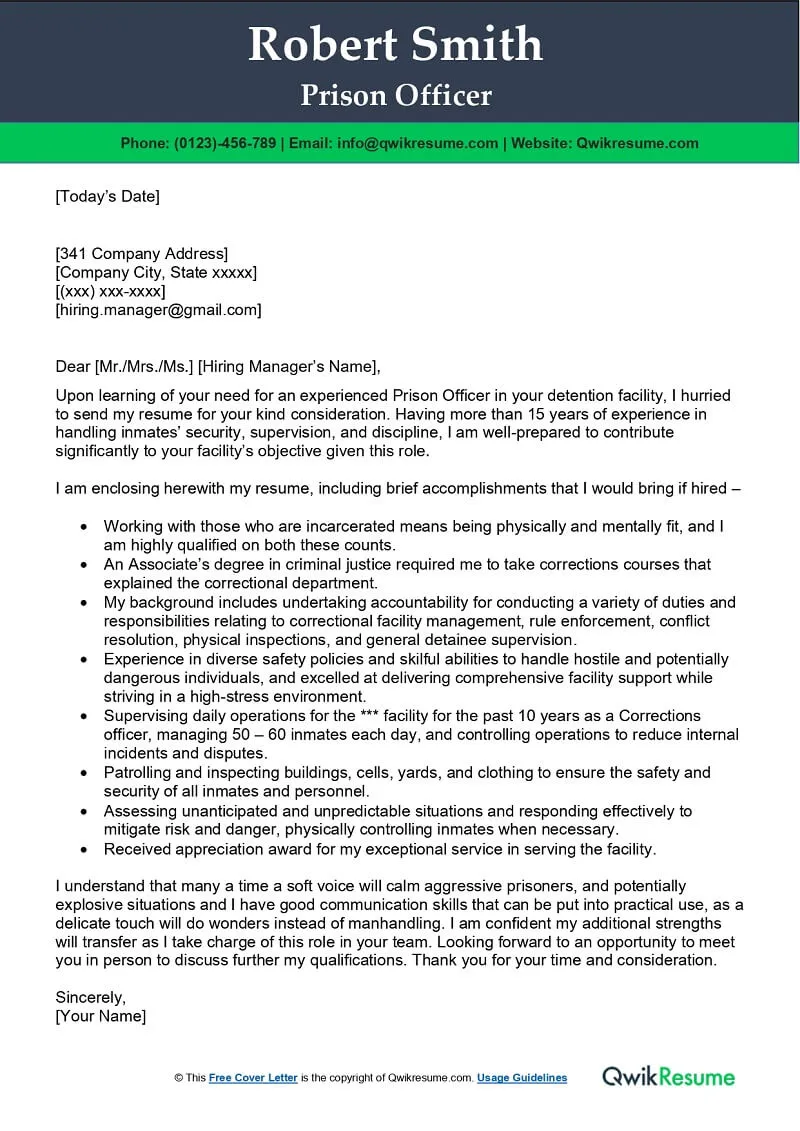
Even without direct experience, you can demonstrate your understanding of the correctional officer role through research and preparation. Your cover letter should reflect a clear grasp of the responsibilities, challenges, and expectations associated with the job. Mention specific duties, such as monitoring inmates, enforcing rules, maintaining order, and ensuring security. You should also address the ethical considerations and the importance of professionalism. Demonstrate that you understand the importance of following protocols, maintaining confidentiality, and treating all individuals with respect. Consider mentioning any relevant coursework, training, or certifications you’ve completed, such as first aid, CPR, or self-defense. This helps the reader see how you’ve started to learn what the job entails. Your goal is to convince the reader that you possess the knowledge and understanding necessary to succeed.
Researching the Facility and Its Values
Personalizing your cover letter to the specific facility is crucial. Research the correctional facility where you are applying, learn about its mission, values, and any recent news or initiatives. Referencing this information in your cover letter shows your genuine interest and your willingness to align yourself with the organization’s goals. For example, if the facility has a specific rehabilitation program, express your interest in contributing to it. Mention any values that resonate with you, such as integrity, respect, or teamwork. You should also visit the facility’s website, read their annual reports, and follow their social media accounts. Doing this shows the recruiter that you are genuinely interested in the specific job you are applying for. When you show that you took the time to conduct research, you demonstrate your attention to detail and commitment.
Expressing Your Enthusiasm and Motivation
Your cover letter is your chance to convey your passion for the role and your motivation for becoming a correctional officer. Express your genuine interest in the job, explaining why you are drawn to this career path. Share your personal reasons for wanting to serve and protect, and demonstrate your commitment to upholding the law and contributing to the safety of the community. Avoid generic statements; instead, be specific about what motivates you. Explain what attracts you to the role, whether it’s the opportunity to make a difference, the challenges of the job, or the chance to work in a structured environment. Show your genuine interest in contributing to the safety and security of the community. Let the hiring manager know that this is a career path you’re serious about, and you are not just looking for a job.
Structuring Your Cover Letter Effectively
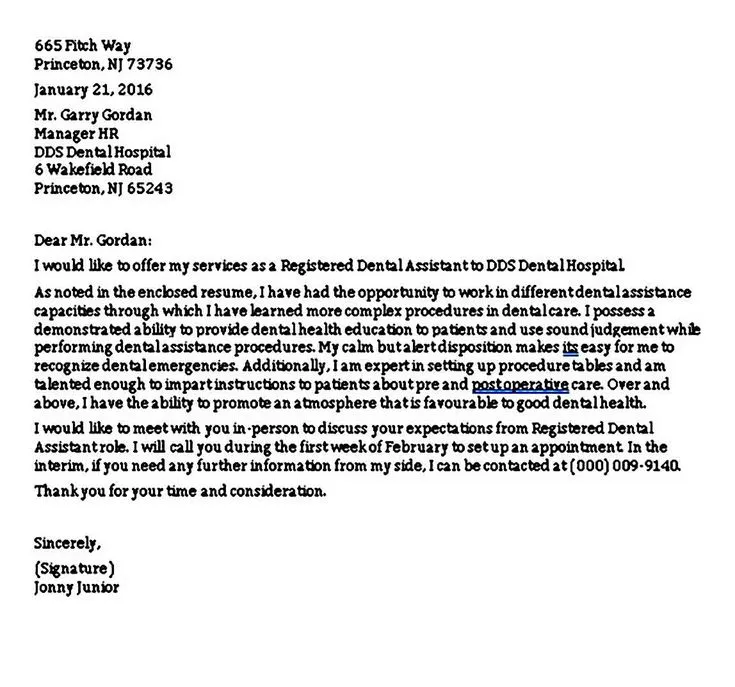
A well-structured cover letter is easy to read and showcases your qualifications in a clear, organized manner. Start with a professional heading that includes your contact information and the date. Address the letter to the hiring manager by name, if possible; otherwise, use a professional greeting like “Dear Hiring Committee.” The main body of your letter should be divided into three to four paragraphs, with each paragraph focusing on a specific aspect of your qualifications or your motivation. The first paragraph should introduce yourself and state the position you are applying for, along with where you saw the posting. In the following paragraphs, highlight your transferable skills, your understanding of the role, and your enthusiasm. End with a strong closing statement that reiterates your interest and thanks the reader for their time and consideration. You must proofread it before sending it to the recruiter.
Formatting and Length
Formatting plays a critical role in making your cover letter appealing to the reader. Use a professional font, such as Times New Roman or Arial, with a font size between 10 and 12 points. Ensure that your letter is well-spaced and easy to read. Keep the letter concise, ideally no more than one page. Use clear and concise language, avoiding jargon and overly complex sentences. Break up long paragraphs into shorter ones to improve readability. Use bullet points to highlight key skills or accomplishments. Ensure that your cover letter is free of grammatical errors, typos, and inconsistencies. Proofread your letter carefully before submitting it, or have someone else review it. A well-formatted cover letter shows attention to detail and respect for the hiring manager’s time.
Proofreading and Editing
Proofreading and editing are essential steps in creating a winning cover letter. Errors in grammar, spelling, or punctuation can undermine your credibility and make a negative impression on the hiring manager. Before submitting your cover letter, carefully review it for any mistakes. Use a grammar and spell checker, but don’t rely on it entirely. Read the letter aloud to catch any awkward phrasing or sentences. Consider having a friend, family member, or career counselor review your cover letter for feedback and suggestions. A fresh pair of eyes can often spot errors or areas for improvement that you might have missed. Proofreading is the final step in ensuring that your cover letter is polished and professional.
Showcasing Your Personality and Suitability
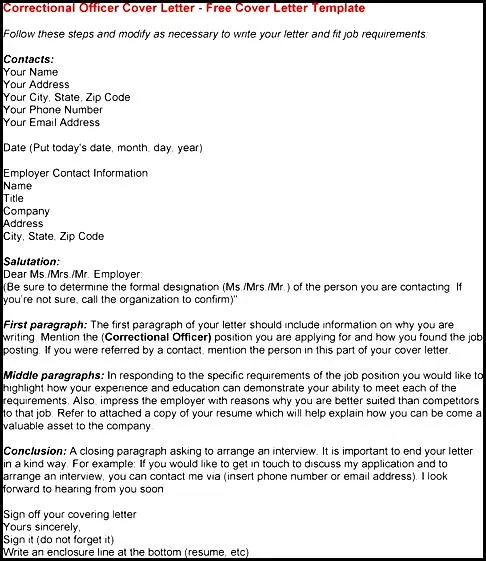
While it’s important to maintain a professional tone, your cover letter should also allow your personality to shine through. Correctional officers often work in high-stress environments, so demonstrate that you are adaptable, resilient, and possess a positive attitude. Share anecdotes or examples that showcase your personality, such as your ability to remain calm under pressure, your commitment to teamwork, or your dedication to helping others. Be genuine and let your authentic self be seen. Be enthusiastic and highlight your interest in the job. It can be easy to see that you are a perfect fit for the team. Remember, the goal is to show that you are not only qualified but also a good fit for the correctional facility’s culture.
